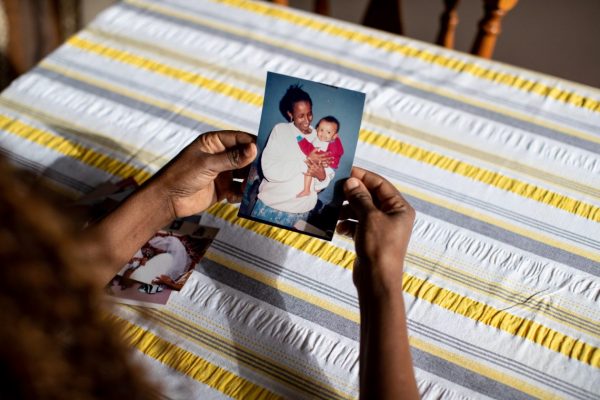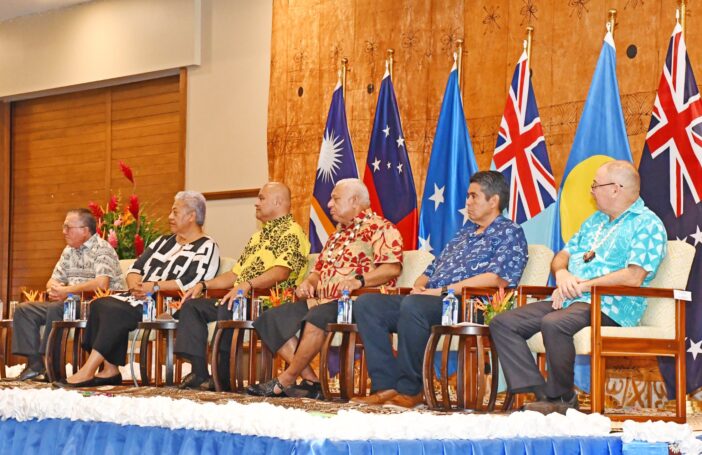“Being separated is not good for yourself or your children… it weighs on you heavily, especially for your mental health, it’s not good. It’s very isolating. Being away from your family is like being separated from within yourself — being torn apart.” – Lelisse
Lelisse, who was reunited with her family in Australia, after seeking refuge from Ethiopia, looks at old photographs in their family home, Melbourne, Australia (Credit: Kim Landy/OxfamAUS)
Lelisse, her husband Dabessa, and their children shared their story of separation and reunion with Oxfam to help form the foundation of our push to make it easier for refugees and humanitarian migrants to reunite with their families in Australia.
Their experience illustrates in painful detail how stressful and hard it is for refugees settled in Australia to try and build a new life here, when family members they love dearly are missing, living in danger in the war-torn countries they’ve fled, or struggling to survive in a refugee camp on the other side of the world.
New research as part of a collaboration between Oxfam and Monash University shows that family unity is a key element to successful resettlement for refugees and humanitarian migrants in Australia. Humanitarian migrants experiencing family separation and waiting for family overseas to join them in Australia have a higher probability of mental illness and post-traumatic stress disorder (PTSD) and are more likely to have had no engagement in study or job training.
The effects of family separation are greater for women who are more likely to be single parents, unemployed, experiencing financial hardship and therefore less likely to be sending money to family overseas, all of which pose risks to their mental health.
Despite this, family reunion is effectively out of reach for refugees and humanitarian migrants in Australia. There are extremely limited places available – in both the Migration Program and the Refugee and Humanitarian Program – along with other barriers including prohibitive costs, high evidentiary requirements and a narrow definition of who counts as ‘family’. These barriers mean that people face costs of up to $47,000 and wait times of up to 30 years to reunite with their loved ones.
So, from the perspective of those to whom we have offered refuge and their families, we can and must do better.
From a global perspective too, we must do better.
And Australia has formally recognised this. Australia is a signatory to the New York Declaration for Refugees and Migrants, and the Global Compact on Refugees. We are thereby committed to ensuring flexible arrangements that assist family reunion and to make commitments to facilitate effective procedures and clear pathways for family reunion. The upcoming Global Refugee Forum in mid-December is a key opportunity for the government to show that it intends to act meaningfully on its commitments and in light of the scale of global forced displacement.
Australia has a long history of successfully welcoming and supporting refugees and humanitarian migrants. We understand personally and culturally that it’s the right thing to do. Welcoming more refugee and humanitarian migrants and doing more to keep families together also seems like the right thing to do – both globally and for those already in our community. Unfortunately, this in itself is not the argument winner. Our government, and some Australians, are not in favour of supporting more refugees or allowing more family members to be resettled here, partly due to a concern over cost. So, we looked into the numbers.
Oxfam commissioned the team at Deloitte Access Economics to help us answer the question: “What would be the impact on Australia’s economy of increasing the annual refugee and humanitarian intake from 18,750 currently to 44,000 by 2022/23?”
The findings are unequivocal: increasing Australia’s Refugee and Humanitarian Program could increase the size of the economy by $37.7 billion in today’s dollars over the next 50 years. It would also lead to on average 35,000 additional jobs in the Australian economy every year for the next 50 years.
The numbers look good for the Australian economy. And within them there are other stories of opportunity to be told.
Deloitte Access Economics’ analysis showed that, compared to the broader Australian population, a higher share of first-generation humanitarian migrants are employed in health care and social assistance sectors. Australia’s aging population and the expansion of large-scale programs, such as the National Disability Insurance Scheme, mean that there will be additional demand for people with the right skill set to fill caring positions. This highlights the opportunity for humanitarian migrants to fill future potential skill shortages in the health sector.
Additionally, there is growing attention being paid to the population and skills shortages that exist in regional Australian towns and cities, and recognition of the real opportunity presented by increasing the refugee and humanitarian intake to help these communities grow and flourish. The evidence also shows that this resettlement and community growth works best when it’s approached at a family level.
Of course, the primary motivator for Australia’s refugee and humanitarian intake – and for doing more to bring families together within this – is one of values. However, it is now clear that this is not just the right thing to do for those families.
We should do everything we can to keep families together. It will hugely benefit them, and now we also know the social and economic benefits for the rest of our society will resonate for decades to come.
Oxfam is calling on the Australian Government to:
- create a Humanitarian Family Reunion visa stream within the Refugee and Humanitarian Program, of 10,000 places annually, specifically designed to make it easier for humanitarian migrants to be reunited with their family members; and,
- progressively increase Australia’s overall Refugee and Humanitarian Program to 44,000 places by 2022/23, including the family reunion stream and 22,000 places specifically for UNHCR referred refugees.






